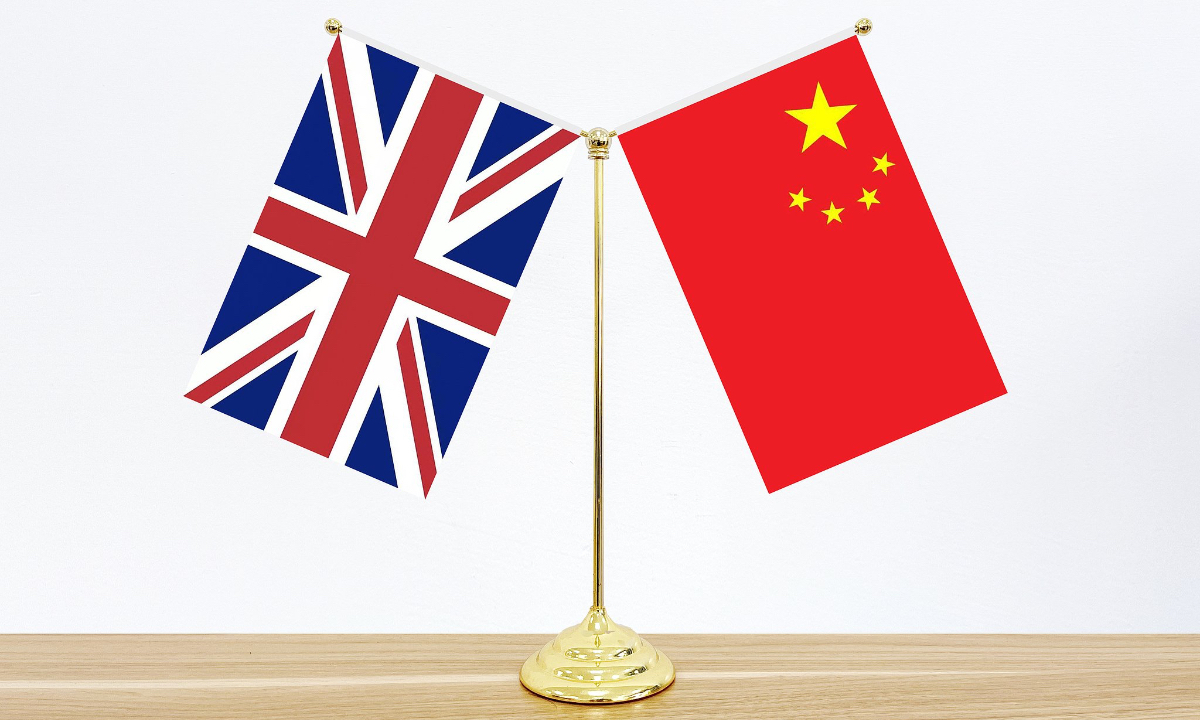


China-UK Photo: VCG
British Chancellor of the Exchequer Rachel Reeves started to visit China from Saturday and jointly restarted with the Chinese side the China-UK Economic and Financial Dialogue that had been suspended for six years. After Keir Starmer came to power last year, his administration conveyed the willingness to improve relations with China. In November 2024, Chinese President Xi Jinping and British Prime Minister Keir Starmer met during the G20 Summit in Brazil, the first time since 2018 when the leaders of the two countries met in person, marking important progress in bilateral relations. The resumption of economic and financial dialogue between the two sides is a concrete action to implement the important consensus reached by the leaders of the two countries.
China-UK relations have shown signs of warming up under the support from leaders of the two countries, and “pragmatic” has become the key word. The world has noticed that Reeves mentioned “pragmatic” four times in her closing speech at the dialogue, hoping to develop a “pragmatic and predictable” relationship with China. During the dialogue, the two sides reached a series of mutually beneficial and win-win results and consensus. Reeves told the British media that she looked forward to China issuing its first overseas sovereign green bond in London this year.
Vice Premier He Lifeng, who co-chaired the dialogue, also said that China welcomes British financial companies to expand RMB services and welcomes British companies to participate in China’s green finance and pension industries. The search for respective strengths and common ground and the promotion of cooperation in this way is highly anticipated by the various sectors of the two countries, especially the business communities. Although China and the UK have differences in history, culture, values and social systems, they share extensive common interests. The history since the establishment of diplomatic relations between China and the UK has also proved that differences do not necessarily lead to confrontation. The important thing is to seek and expand the scope of cooperation between the two countries in a pragmatic manner. Over the past decade or so, the China-UK Economic and Financial Dialogue has achieved great results. During this period, the UK became the first major Western country to apply to join the AIIB. China’s sovereign bonds were issued in London for the first time and the Shanghai-London Stock Connect was launched. The two sides strengthened the strategic alignment between the joint construction of the Belt and Road Initiative and the Northern Powerhouse plan. These results have promoted the internationalization of the RMB, deepened the interconnection of financial markets of both sides, and enhanced cooperation in investment, trade and technological innovation between the two sides. This has accumulated lessons and confidence for the reset and expansion of more cooperation areas at this stage.
The delegation accompanying Reeves on her visit to China includes the Governor of the Bank of England, the Chairman of Standard Chartered and the Chairman of HSBC. This lineup of top banking executives reflects British capital’s strong interest in the Chinese market, long-term confidence in China’s economic growth potential, and trust in China’s policies for further opening up its financial markets. Finance is often referred to as the “crown jewel” of Britain’s economy, and London, as one of the biggest global financial hubs, boasts a mature system and robust capital strength. Meanwhile, as the world’s second-largest economy, China has an increasing need for international financial cooperation. The complementary advantages between the two countries are unique and significant. Making mutual benefit and win-win cooperation the main theme of China-UK relations is both timely and necessary.
Amid economic globalization, engaging with China is not a luxury but a necessity. China-British Business Council Chair Sir Sherard Cowper-Coles said, given the large number of middle-class people in China, “it’s madness not to engage.” According to the UK Treasury, exports to China supported more than 455,000 UK jobs in 2020. A report released by the British Chamber of Commerce in China late last year showed that 76 percent of UK companies would maintain or increase their investments in China. For China, proactively expanding international exchanges, keeping its doors to the world ever wider, and providing new opportunities globally remains a constant commitment. China-UK joint efforts to enhance bilateral interaction have provided more convenience to the operations of British businesses in China.
In the face of global challenges such as climate change and regional security, the two countries share increasingly overlapping interests, and strengthening cooperation has become a common aspiration for both sides and the world. During her visit to China, asked whether the UK would follow the US and EU in imposing tariffs on Chinese electric vehicles, Reeves responded that the UK would “make decisions in our national interest.” To some extent, the UK’s new government has demonstrated the strategic autonomy in its China policy.
At present, the foundation for the warming of China-UK relations is not solid enough, including the influence of external factors such as the US, as well as the domestic political game and public opinion environment in the UK, all of which have an impact on the relations between the two countries. However, the efforts of China and the UK to engage in dialogue in a pragmatic spirit have opened a window of confidence for further turnaround and stability of bilateral relations in the future. The restart of the China-UK Economic and Financial Dialogue is a return to rationality, but the next chapter for the healthy and stable development of China-UK relations requires both to properly manage differences, consolidate political mutual trust, and promote a predictable future amid pragmatic development.